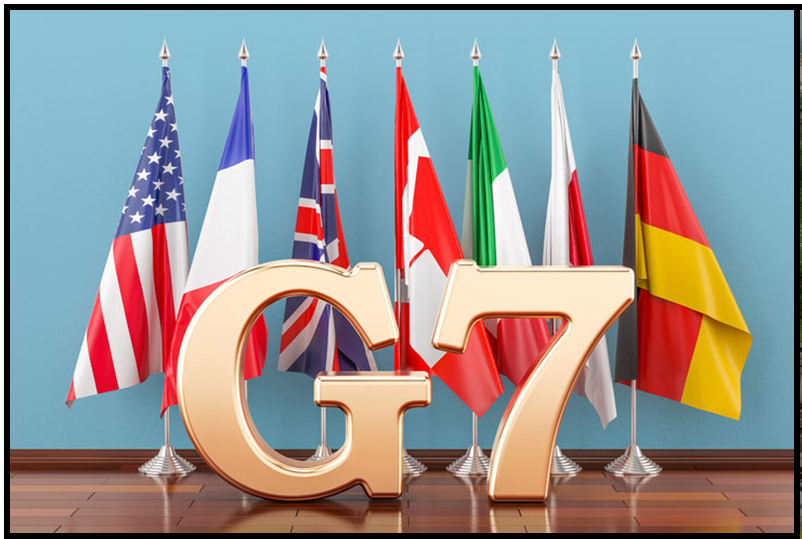WHERE DOES INDIA STAND WITH RESPECT TO G7?
Syllabus:
- GS-2- India’s Foreign policy , G-7 ,multilateralism and preserving India’s sovereignty
Focus :
- The article discusses the recent G-7 summit held in Italy’s Apulia region from June 13-15, highlighting key topics such as bridging global divisions, supporting Ukraine, investing in Africa, and addressing climate change and artificial intelligence challenges. It emphasizes India’s significant role in the G-7 process and the broader implications for the future of the G-7 in a changing global landscape.
Source - TH
G-7 Summit Overview
- Location and Dates: The G-7 summit took place in Italy’s Apulia region from June 13-15.
- Participants: Leaders from the U.S., Canada, Germany, France, Japan, the U.K., and Italy, along with the European Union leadership.
- Key Invitees: India, represented by Prime Minister Narendra Modi, attended for the fifth time out of eleven invitations.
- Agenda: The summit focused on bridging differences between the “West and the Rest,” funding support for Ukraine, investing in Africa, and addressing migration, climate change, and artificial intelligence.
Key Outcomes and Discussions
- Ukraine Support: Agreement to make an additional $50 billion available for Ukraine, sourced from frozen Russian sovereign wealth funds.
- Energy for Growth in Africa: Special summit aimed at spurring investments in clean energy on the continent.
- Global South Concerns: Outreach included leaders from ten countries and various multilateral organizations to discuss issues pertinent to the Global South.
- Criticism of China: G-7 leaders criticized China’s coercive trade practices.
- Reputation Management: The G-7 sought to counter its image as a grouping of old Western elites amidst internal political challenges.
India’s Role and Importance
- Strategic Participation: India, an important member of the Global South and the G-20 troika, used the platform to voice concerns and showcase achievements.
- Modi’s Contributions: Prime Minister Modi highlighted the significance of Indian elections, the role of technology and AI in reducing inequality, and the need for climate action.
- Bilateral Engagements: Modi met with leaders from the U.K., France, Germany, Japan, and Italy, and had brief interactions with the U.S. and Canadian leaders, as well as Ukraine’s President Zelenskyy.
Challenges Facing the G-7
- Perception Issues: The G-7 is seen as an elitist and non-inclusive group, lacking representation from major economies like China, India, and Brazil.
- Ineffectiveness in Global Issues: Criticized for its inability to alter the course of major global conflicts such as Russia’s invasion of Ukraine and Israel’s actions in Gaza.
- Competition from BRICS: The BRICS group has expanded, posing a challenge to the G-7’s relevance with new members including UAE, Saudi Arabia, Iran, Egypt, and Ethiopia.
Future of the G-7
- Upcoming Summit: The next G-7 summit will be held in Canada’s Alberta region in 2025.
- Reinvention Needed: The G-7 faces the challenge of reinventing itself to remain an effective global player amidst shifting geopolitical dynamics and internal political changes.
Importance of G-7 Platform for India
- Showcasing Achievements: The outreach session is crucial for India to present its achievements and perspectives on global issues.
- Strategic Engagement: India’s participation ensures its concerns and priorities are acknowledged at a global level.
- Global South Advocate: Modi’s emphasis on the concerns of the Global South highlights India’s leadership role in this group.
Conclusion
- The geopolitical dynamics surrounding India are intricate and multifaceted, involving careful diplomacy, strategic alliances, and managing historical grievances.
- With significant internal political changes and complex external relationships, India’s role in the global arena is poised for nuanced evolution.
Source:The Economic Times
Associated Article :
https://universalinstitutions.com/discuss-the-continuity-and-change-in-indias-foreign-policy/
Mains Practice Question :
GS-2
” Discuss the significance of India’s participation in the G-7 outreach sessions and its impact on global diplomacy. Evaluate the challenges faced by the G-7 in maintaining its relevance in the contemporary international order?”(250 words)




